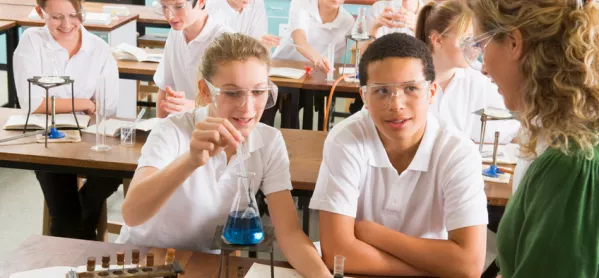Want to keep up with the latest education news and opinion? Follow TES USA on Twitter and like TES USA on Facebook
To start 2017, I made the resolution to improve my teaching by including more focus on the voices of science, the nature of discovery, and how science gets done.
I wanted to share that goal and highlight some great people, resources, and background on the nature, history, and philosophy of science to guide us along the way. In our first segment with Erik Peterson, we talked about how the history of science gives students a view of science that is dramatically different from what they see in the classroom and in their textbooks.
In our next segment, I talk to author and historian Lydia Pyne whose 2016 book Seven Skeletons is a must read if you have any interest in science, history, evolution, and even pop-culture.
The book is a historically accurate exploration of celebrity fossils in the human timeline but with the added voice of conflict, discovery, intrigue, and humanity that make it read like a beloved fiction. It captures the intricate reality of science in the field while also deeply examining the identities we impart on fossils and the cultural narratives we craft around those identities that make them so much more than old bones. I found it an addictive read.
Here is my conversation with Lydia Pyne:
Amanda: I have had the pleasure of reading your recent book Seven Skeletons, but our readers might just be hearing about it. Can you tell them a bit about who you are and what you do?
Lydia: I’m a writer with a background in archaeology and history of science and I’ve worked on field projects in South Africa, Ethiopia, Uzbekistan, and the American Southwest. My writing focuses on the intersection of history, science, and culture. I write books, essays, and articles - again focusing on how history, science, and culture intersect.
Amanda: You have a talent for bringing stories to life and doing so in a way that connects to pop-culture among other things. You obviously grasp that these stories are important enough to share with as many people as you can. What about in education? Why is the historical side of science so important?
Lydia: I think history of science teaches us how scientific knowledge is actually created and how the creation of that knowledge has changed over time. History of science is full of great stories, big questions, and interesting characters.
I worry that if we focus just on the most “current state” of scientific knowledge, we miss understanding how people have tried to answer similar questions in the past and miss out on how scientific knowledge it built up over time.
A lot of the misconceptions about how science works are misconceptions about the history of science and its processes. If we can integrate more history of science into science classes, it helps humanize the scientific process. It puts people there, doing science, asking questions and shows what’s changed (and what hasn’t!) in how people think about a particular scientific question of process.
Amanda: Can you share a little about what got you into this field that in so many ways is a walk between two seemingly different ways of viewing the world?
Lydia: The first time I went to South Africa, I had the opportunity to see several famous fossils that were incredibly important in the history of studying human evolution. Seeing the real thing and not just a cast of a fossil was an amazing experience. I loved the idea that these fossils were characters in the history of human evolutionary science for so long and that they continue to have influence and impact today as researchers continue to study them.
Amanda: Lydia, in closing, do you have any resources you recommend for classroom teachers interest in incorporating more history of science in their teaching?
Lydia: There are some great examples of history of science that could be applicable to classroom teachers - either as background reading or as supplemental texts, depending on the grade or subject. A couple of my own favorites are The Abacus and the Cross: The Story of the Pope Who Brought the Light of Science to the Dark Ages by Nancy Brown or Missing Linksby John Reader. Also, several archives that house history of science materials have fabulous online collections where historical objects/texts are scanned and easily accessible - the Chemical Heritage Foundation for example, has some fantastic examples of alchemy and early chemistry that could be really interesting to high school classes.




